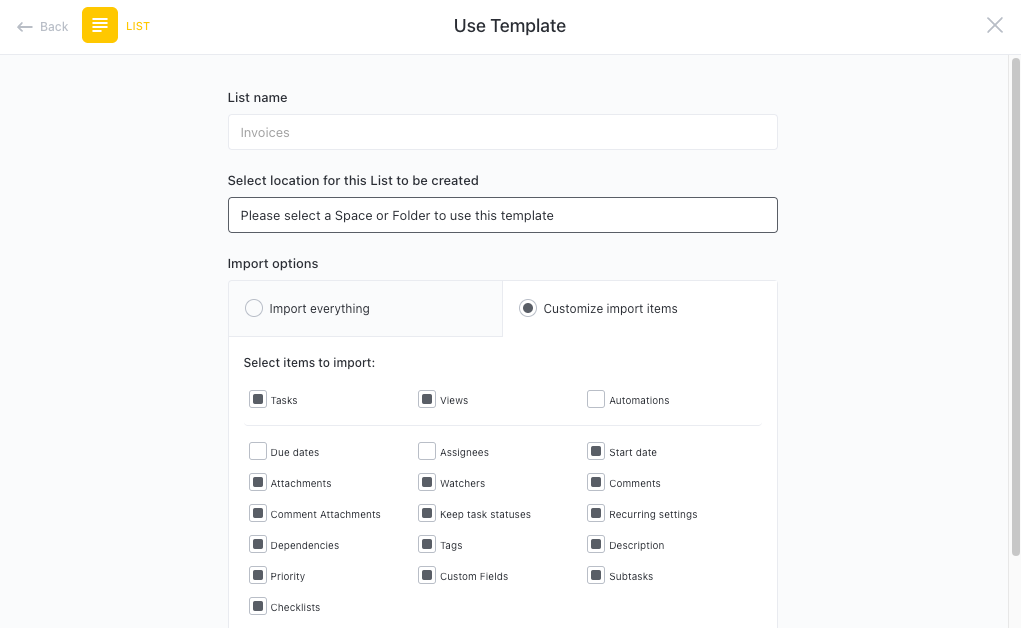When it comes to managing projects, a good Statement of Work (SOW) is essential. A SOW sets the expectations between a company and its clients or contractors by outlining project goals, deliverables, timelines, and more.
Creating a detailed SOW can be time-consuming but ClickUp's Statement of Work Template makes it easier than ever. This template helps you:
- Streamline the SOW creation process
- Outline project details quickly and accurately
- Keep everyone on the same page throughout the project
Whether you're creating an SOW for internal use or client work, this template will help make sure all your bases are covered!
Benefits of a Statement of Work Template
When you have a well-crafted SOW template, you can ensure that projects are delivered on time, on budget, and with the desired results. The benefits of using a SOW template include:
- Defines the scope of the project and sets expectations for all parties involved
- Provides a clear timeline for completion
- Outlines the roles and responsibilities of each party
- Helps avoid misunderstandings and minimize the risks of non-performance
Main Elements of a Statement of Work Template
ClickUp's Statement of Work Template is designed to help you create and track legal contracts. This Doc template includes:
- Custom Statuses: Create tasks and contracts with various custom statuses to keep track of the progress of each project
- Custom Fields: Categorize and add attributes to manage your project contracts and easily visualize the progress of a project
- Custom Views: Start with this Doc template and build out your ClickUp workflow which includes List, Gantt, Workload, Calendar, and more
- Project Management: Improve statement of work tracking with time tracking capabilities, tags, dependency warnings, emails, and more
How to Use a Statement of Work Template
Creating a SOW is an important part of the project management process. It serves as a detailed plan outlining the scope of the project, timeline, deliverables, and any other relevant information.
1. Establish the scope of the project
The most important step in creating a Statement of Work is defining the scope of the project. Think about what tasks need to be completed, what resources are needed, and what the timeline is.
Create tasks in ClickUp to break down the project into manageable parts and assign tasks to team members.
2. Set goals and objectives
Setting clear goals and objectives will help ensure that the project stays on track and that everyone is on the same page. Establishing measurable metrics will help you evaluate the success of the project.
Use Goals in ClickUp to measure and track progress toward your objectives.
3. Define deliverables
The Statement of Work should clearly define the deliverables of the project and how they will be evaluated. This includes both tangible and intangible results, such as reports, presentations, and changes to processes.
Use the Gantt Chart in ClickUp to create a timeline for each deliverable and make sure everything is completed on time.
4. Outline payment terms
The SOW should also include a section that outlines the payment terms for the project. This includes the payment schedule, payment methods, and any other relevant information.
Use Milestones in ClickUp to track progress and set deadlines for payments.
Get Started with ClickUp's Statement of Work Template
Contractors and freelancers can use this Statement of Work Template to help everyone stay on the same page when it comes to drafting and managing contracts.
First, hit “Add Template” to sign up for ClickUp and add the template to your Workspace. Make sure you designate which Space or location in your Workspace you’d like this template applied.
Next, invite relevant members or guests to your Workspace to start collaborating.

Now you can take advantage of the full potential of this template to create a statement of work:
- Identify the need for the project and the scope of work that needs to be done
- Collaborate with stakeholders to determine the timeline and budget for the project
- Ensure each task is clearly defined and documented
- Outline the roles and responsibilities of each team member
- Set up notifications to stay up-to-date on progress
- Hold regular meetings to discuss progress and any issues
- Monitor and analyze tasks to ensure maximum productivity
Get Started with Our Statement of Work Template Today







